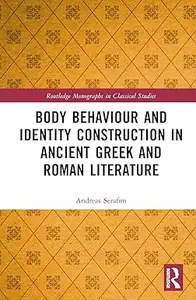
Free Download Body Behaviour and Identity Construction in Ancient Greek and Roman Literature
by Andreas Serafim
English | 2025 | ISBN: 1032288582 | 265 Pages | True PDF | 18 MB
This book offers the first systematic, up-to-date, study of "semi-volitional bodily behaviour" (sneezing, spitting, coughing, burping, vomiting, defecating, etc.) in the classical world.
Examining verse and prose texts, fragments, and scholia from the age of Homer to the second century AD, the central argument put forward in this volume is that semi-volitional bodily acts have the potential to betray individual or collective (ethnic/civic and cultural) identities centred on a variety of different themes. Discussions specifically focus on the following five aspects of the interplay between semi-volitional body language and identity construction: sexuality and gender; the link between sexuality and socioeconomic identity of individuals or groups; the embodied markers of civic/ethnic and cultural collectives and the contrast between "we-ness" and "otherness"; ēthos and emotions; and how dietary habits and illnesses indicate the "somo-psychosocial" identity of individuals or groups. The book offers a comprehensive understanding of representations of the human body in ancient Greece and Rome, while reopening the complex and fascinating discussion about the relationship between intention, mind, body, and identity.
This book offers a fascinating study suitable for students and scholars of classics and ancient Greek and Roman history. It is also of interest to those in a variety of other disciplines, including body culture studies, gender and sexuality studies, and performance studies, as well as sociology, anthropology, cognitive medicine, and the history of medicine.
